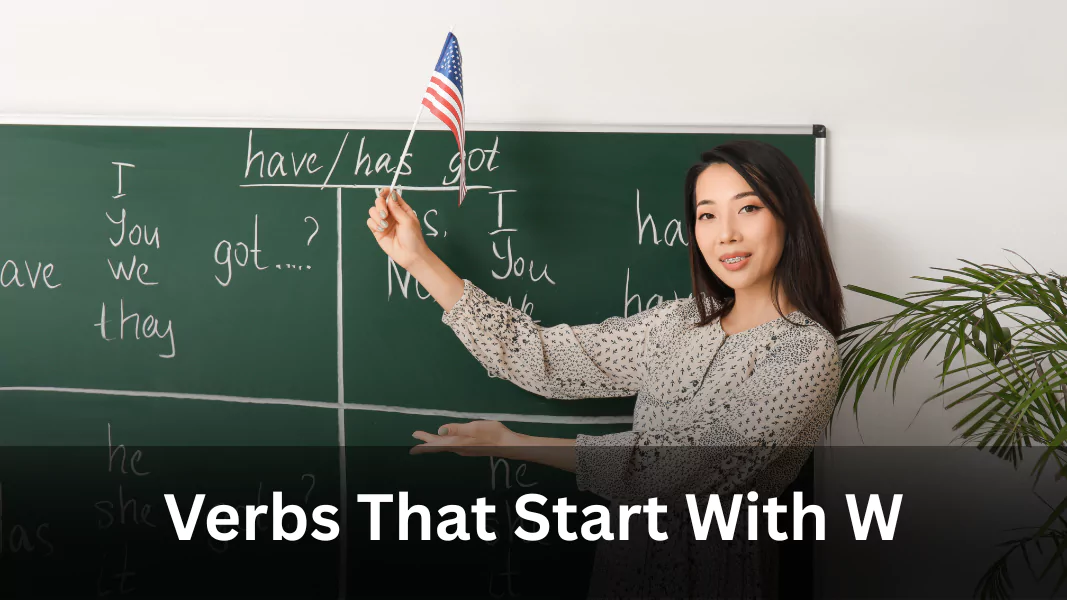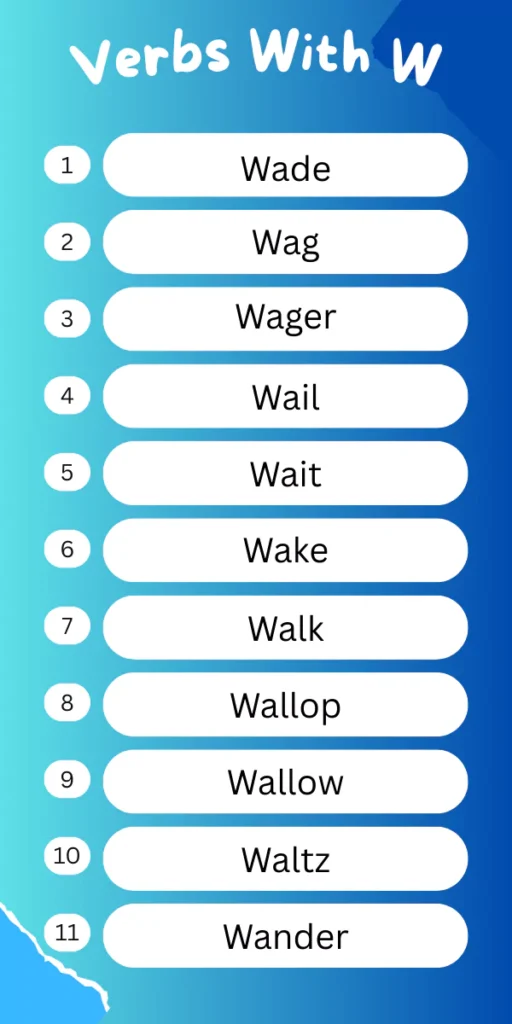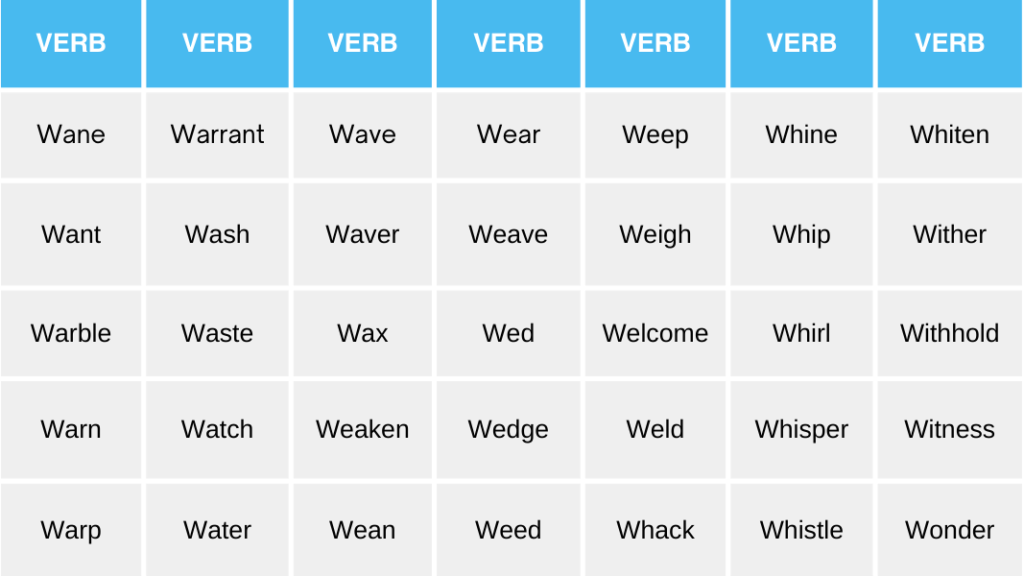Verbs That Start With W – List of Positive, Action, and Common W Verbs

The letter W, though tucked away in the latter part of the alphabet, carries a world of energy and expression. From words that wish, weave, and win, verbs beginning with W bring warmth, movement, and positivity into our language. Verbs are the heartbeat of communication, they set our thoughts and subjects in motion and learning verbs that start with W is a powerful way to expand vocabulary, improve writing, and add richness to everyday conversations. Whether you’re searching for impactful verbs for creative writing, professional communication, or simply to strengthen your word knowledge, this guide to verbs beginning with W will give you a comprehensive collection to explore.
List of Verbs That Start With W
The list of verbs that start with W is both diverse and dynamic, covering everything from simple, everyday actions like walk and wait to more expressive choices such as weave, whisper, and wonder. This collection showcases the versatility of W-verbs, offering options for casual speech, descriptive storytelling, and persuasive writing alike. By familiarizing yourself with these words, you can enhance your ability to communicate with clarity, creativity, and confidence.

Common Verbs Starting With W
- Wait – to stay in place until something happens.
Example: She had to wait for the bus in the rain. - Walk – to move on foot at a normal pace.
Example: They walk to school every morning. - Want – to desire something.
Example: I want a cup of tea. - Wash – to clean with water or soap.
Example: He needs to wash his hands before dinner. - Watch – to look at something attentively.
Example: We watch movies on weekends. - Work – to perform a task or job.
Example: She works as a teacher in the city. - Win – to be victorious in a competition.
Example: Our team hopes to win the match. - Wish – to hope or desire for something.
Example: I wish you a happy birthday. - Write – to put words on paper or screen.
Example: He likes to write stories in his free time. - Wear – to have clothing or accessories on your body.
Example: She decided to wear a red dress. - Wave – to move one’s hand to greet or signal.
Example: The children wave goodbye to their parents. - Wake – to stop sleeping.
Example: I wake up early every morning. - Wonder – to think with curiosity.
Example: I wonder what he is planning. - Whisper – to speak very softly.
Example: She whispered a secret to her friend. - Worry – to feel anxious or troubled.
Example: Don’t worry about the small mistakes.
Positive Verbs Starting With W
- Welcome – to greet warmly.
Example: They welcome guests with a smile. - Wish – to express goodwill or hope.
Example: I wish you success in your exams. - Win – to achieve victory or success.
Example: She hopes to win the scholarship. - Wonder – to admire or feel curiosity.
Example: I wonder at the beauty of nature. - Worship – to show deep respect or devotion.
Example: They worship together every Sunday. - Work – to contribute effort or skill.
Example: We work hard to achieve our dreams. - Weave – to create or connect together.
Example: She weaves beautiful stories into her art. - Wishful – to express hope positively.
Example: He wishes for peace in the world. - Warm – to make someone feel comforted.
Example: Her smile warms everyone’s heart. - Witness – to observe and acknowledge positively.
Example: We witnessed a historic moment together. - Win over – to gain someone’s support or love.
Example: His kindness won over the audience. - Wholesome – to encourage good health or morality.
Example: They promote wholesome values in their community. - Widen – to expand opportunities or horizons.
Example: Reading widens our understanding of the world. - Withstand – to resist challenges with strength.
Example: She withstood all difficulties and succeeded. - Warrant – to justify or make something deserving.
Example: His efforts warrant recognition.
Action Verbs Starting With W
- Walk – to move by putting one foot in front of the other.
Example: They walk to the park after school. - Wave – to move your hand in greeting or farewell.
Example: She waved to her friends from the car. - Whisper – to speak softly.
Example: He whispered the answer to me. - Wink – to close and open one eye quickly.
Example: She winked at him playfully. - Whip – to move or strike quickly.
Example: The wind whipped the leaves off the trees. - Whistle – to produce a high-pitched sound with lips.
Example: He whistled a happy tune. - Wash – to clean using water.
Example: Please wash the dishes after dinner. - Write – to record words on paper or screen.
Example: She writes poems every evening. - Wag – to shake or move rapidly.
Example: The dog wagged its tail with excitement. - Wander – to move without purpose.
Example: They wandered through the old streets. - Work – to engage in a task or duty.
Example: He works at a construction site. - Win – to succeed or be victorious.
Example: Our team won the championship. - Withdraw – to pull back or remove.
Example: He decided to withdraw from the contest. - Wield – to hold and use (a tool or weapon).
Example: She wields her pen like a sword. - Wrestle – to struggle or fight physically.
Example: They wrestle for fun in the backyard.
Regular Verbs That Start With W
| Verb | Meaning | Example |
|---|---|---|
| Wait | to remain until something happens | She waited for the train. |
| Walk | to move on foot | They walked across the bridge. |
| Want | to desire something | He wanted a new phone. |
| Wash | to clean | She washed the dirty clothes. |
| Watch | to look attentively | They watched the fireworks last night. |
| Wave | to signal with the hand | He waved at the passing car. |
| Warn | to give notice of danger | She warned him about the slippery floor. |
| Wander | to roam without a fixed course | They wandered in the forest for hours. |
| Wanton | to behave recklessly | He wantoned away his opportunities. |
| Wish | to desire or express hope | She wished for success. |
| Wonder | to think curiously | He wondered about life’s mysteries. |
| Worry | to feel anxious | She worried about the exam. |
| Wrestle | to struggle or fight physically | They wrestled in the yard. |
| Whistle | to make a sound with lips | He whistled as he worked. |
| Work | to perform a duty or task | They worked late into the night. |
Irregular Verbs Starting With W
- Wake – woke – woken – to stop sleeping.
Example: She woke up early today. - Wear – wore – worn – to have clothes on your body.
Example: He wore a blue jacket to the party. - Weave – wove – woven – to interlace threads or elements.
Example: The artisan wove a colorful basket. - Win – won – won – to achieve victory.
Example: Our team won the match yesterday. - Withdraw – withdrew – withdrawn – to remove or pull back.
Example: He withdrew money from the bank. - Withhold – withheld – withheld – to keep back or refuse.
Example: They withheld important information. - Withstand – withstood – withstood – to resist or endure.
Example: The building withstood the earthquake. - Wind – wound – wound – to turn or twist around.
Example: She wound the thread around the spool. - Write – wrote – written – to put words on paper.
Example: He wrote a heartfelt letter. - Wring – wrung – wrung – to twist and squeeze.
Example: She wrung the water out of the towel. - Win over – won over – won over – to gain support or affection.
Example: His charm won over the crowd. - Wring out – wrung out – wrung out – to remove liquid by twisting.
Example: He wrung out the wet cloth. - Wind up – wound up – wound up – to finish or conclude.
Example: The teacher wound up the lesson quickly. - Wend – went – gone (archaic form, like “go”) – to travel or proceed.
Example: They wended their way through the forest. - Wet – wet/wetted – wet/wetted – to make something moist.
Example: Rain wet the streets overnight.
Phrasal Verbs Starting With W
| Verb | Meaning | Example |
|---|---|---|
| Wake up | to stop sleeping | I wake up at 6 a.m. every day. |
| Walk away | to leave a situation | She walked away from the argument. |
| Walk out | to leave suddenly in protest | The workers walked out of the meeting. |
| Walk into | to enter or encounter unexpectedly | He walked into trouble without realizing it. |
| Walk off | to leave in anger or frustration | He walked off after the disagreement. |
| Warm up | to prepare before exercise | Athletes warm up before running. |
| Wash up | to clean dishes or oneself | Please wash up before dinner. |
| Watch over | to guard or protect | She watches over her younger siblings. |
| Wave off | to dismiss or ignore | He waved off their concerns. |
| Weigh in | to give an opinion | The expert weighed in on the debate. |
| Wind down | to relax after activity | They wind down with a book before bed. |
| Wind up | to conclude or finish | Let’s wind up the meeting now. |
| Work out | to exercise or solve a problem | They worked out at the gym this morning. |
| Work on | to spend time improving something | He is working on his communication skills. |
| Write down | to record something | She wrote down the phone number quickly. |
Rare and Unique Verbs Starting With W
- Waffle – to speak vaguely or indecisively.
Example: The politician waffled during the debate. - Wangle – to obtain something by clever means.
Example: He wangled a free ticket to the concert. - Warp – to bend or distort.
Example: Heat can warp wooden furniture. - Wheedle – to persuade through flattery.
Example: She wheedled her way into the group. - Whittle – to carve or shape wood.
Example: He whittled a stick into a toy. - Wriggle – to twist and turn like a worm.
Example: The fish wriggled free from the net. - Wizen – to become dry or shriveled.
Example: The fruit wizened in the sun. - Wreathe – to encircle or coil around.
Example: Mist wreathed the mountain peaks. - Wallow – to indulge in emotions or mud.
Example: He wallowed in self-pity after failing. - Wamble – to feel nauseated or stagger unsteadily.
Example: She wambled after the long boat ride. - Winnow – to separate useful parts from waste.
Example: Farmers winnow grain to remove chaff. - Wham – to strike forcefully.
Example: The ball whammed against the wall. - Wangle – to scheme or manipulate.
Example: He wangled a promotion through charm. - Wrought – (archaic past tense of “work”) to shape or create.
Example: The blacksmith wrought iron into a sword. - Wrangle – to argue noisily.
Example: They wrangled over the contract details.

Popular & Impactful Verbs That Start With W
| Verb | Meaning | Example |
|---|---|---|
| Win | to succeed or achieve victory | She won first place in the contest. |
| Wish | to hope or desire | I wish you happiness and health. |
| Work | to put in effort | He works hard every day. |
| Walk | to move on foot | They walk along the beach together. |
| Write | to compose text | She writes in her journal daily. |
| Wake | to stop sleeping | He woke up feeling refreshed. |
| Watch | to observe carefully | They watched the sunset silently. |
| Wear | to put on clothing | She wore her favorite dress to the party. |
| Wave | to signal with the hand | He waved to his neighbor. |
| Wonder | to think with curiosity | I wonder what the future holds. |
| Welcome | to greet warmly | They welcomed guests into their home. |
| Witness | to observe or see | We witnessed a historical event. |
| Whisper | to speak softly | She whispered a secret in his ear. |
| Withstand | to resist or endure | The old bridge withstood heavy storms. |
| Widen | to expand or make broader | They widened the road for smoother traffic. |
Fun Facts About Words Beginning With W
- Double U or Double V? – The letter W was originally written as “VV” (two V’s) in early Latin texts. Over time, it evolved into the distinct “W” we use today, but in many languages, including French, it’s still referred to as double V.
- W is Rare in Latin Roots – Unlike most English letters, W is not common in classical Latin. That’s why many English words starting with W, like wonder or work, come from Germanic origins rather than Latin.
- Wh- Words Are Ancient – Many wh- words in English (like who, what, when, where, why) trace back to Proto-Indo-European languages and are among the oldest surviving words in English.
- Silent W Trick – In some English words, the W is silent, such as in wrist, write, and wreck. These silent W’s are leftovers from Old English pronunciation, where the W sound was once spoken.
- W is a Linguistic Oddball – The letter W is the only letter in English whose name has more than one syllable (“double-u”). Every other letter is just one syllable, making W truly unique in the alphabet.
Read: Verbs That Start With T
Read: Verbs That Start With U
Read: Verbs That Start With V
FAQs
Conclusion
Words beginning with W carry a wonderful weight in the English language. From common everyday verbs like walk and wait, to powerful impactful verbs such as win, weave, and withstand, the letter W offers a wide variety of expressions that enrich both spoken and written communication. Exploring regular, irregular, action, phrasal, and even rare verbs starting with W not only expands vocabulary but also helps writers, students, and language learners express themselves with greater clarity and creativity. Whether you want to inspire, describe, or persuade, there’s always a W-verb ready to work its magic.
